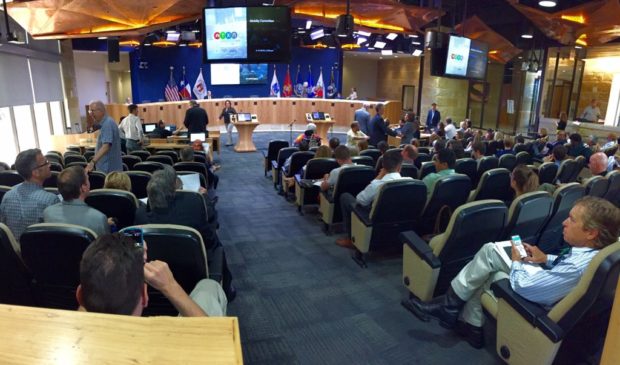Council hopes new rules will shorten meetings
Friday, May 19, 2017 by
Jo Clifton Meetings that stretch into the wee hours of the morning, lengthy work sessions, budget briefings and additional special called meetings have taken a toll on the 10-1 City Council, those feisty newcomers who thought they could reinvent the wheel when they came into office at the beginning of 2015.
During 2016, Council spent about 557 hours in Council meetings and work sessions. That year, 2,386 citizens registered and said they wished to speak, with an additional 775 registered to donate time to other speakers. According to staff calculations, the speakers added 158 hours to Council meetings.
On Thursday, Council adopted a plan it hopes will eliminate some of the hours it spends in meetings and allow members to be more prepared for those meetings. The changes will have the greatest impact on city staff and development representatives as opposed to the general public.
The new rules may cut back on the number of hours Council spends listening to citizen input on various issues because only the first 20 speakers to sign up on a particular item will be allotted three minutes. People who wish to donate time under the new regime will be allowed to give the first 20 speakers two minutes, not three, as has been the practice.
After that, for example, the 21st speaker will still get three minutes but those donating time will only be able to donate one minute apiece.
Frances McIntyre of the Austin League of Women Voters and David King, a member of the Austin Neighborhoods Council and a frequent speaker, complained.
McIntyre said, “We’re concerned that the rules are too restrictive. Taking the first 20 citizens who are signed up to speak and giving them three minutes with the rest of the citizens only (able to donate) one minute seems unlikely to provide enough testimony to represent those opinions of the many who would like to speak, particularly if it is a controversial subject.”
At most under the new rules, a speaker would get seven minutes, she noted, if they were among the first 20 speakers. After that, they would get just three minutes altogether.
The new rules also specify that the total time for public input shall not exceed 90 minutes. The majority of controversial matters that have come before the Council have taken far longer. McIntyre asked members to increase the total time for the public to speak. Of course, Council can waive any of these rules and given enough public pressure it is likely to do so.
Mayor Pro Tem Kathie Tovo offered an amendment that stated, “Whenever possible, Council should attempt to balance time constraints with the need for public input and make an effort to hear three minutes (of) testimony from as many present speakers as possible.”
Mayor Steve Adler said he would follow that rule but did not want it to be part of the written Council regulations because it might create an expectation among the public that everyone would get three minutes. The amendment did not pass.
Tovo offered another amendment that was adopted related to adjourning Council at 10 p.m. Currently, when the presiding officer notices that it is 10 p.m. or after that, he or she will stop the meeting and take a vote on whether to continue. Under the new rules, Council can keep talking about whatever item it is considering at 10 p.m. Tovo’s amendment would give notice to people waiting for other items if Council intends to adjourn or go into recess after the item it is considering.
The biggest change for city staff is that the final agenda must be done 13 days in advance of the Council meeting. If necessary, as Tovo argued, staff and Council may add items by posting an addendum to that agenda on the Friday before the meeting. However, those items would be considered an emergency.
In general, postponements would be for two weeks as opposed to one week. One complicating factor is that Council could discuss items from two different upcoming Thursday agendas at the same Tuesday work session.
However, Council could waive any requirement of the adopted procedures for particular agenda items without amending the procedures.
Chief of Staff Ray Baray explained that Council meeting procedures will now be set forth in a special document and will not be part of city code. That will make it much easier to change should Council decide to do so.
He said with this way Council will be able to instruct staff to make changes to meeting procedures without going through the process of changing an ordinance. “They can just do it by a voice vote and we could go ahead and make those changes. It just makes it more nimble,” Baray said.
The new rules will go into effect for the August 3 meeting. Baray and Catie Powers, the Council agenda process manager, told the Austin Monitor that they chose the August start time for the new process because staff is already preparing for June meetings and changing the process now would be too disruptive.
The Austin Monitor’s work is made possible by donations from the community. Though our reporting covers donors from time to time, we are careful to keep business and editorial efforts separate while maintaining transparency. A complete list of donors is available here, and our code of ethics is explained here.
You're a community leader
And we’re honored you look to us for serious, in-depth news. You know a strong community needs local and dedicated watchdog reporting. We’re here for you and that won’t change. Now will you take the powerful next step and support our nonprofit news organization?









